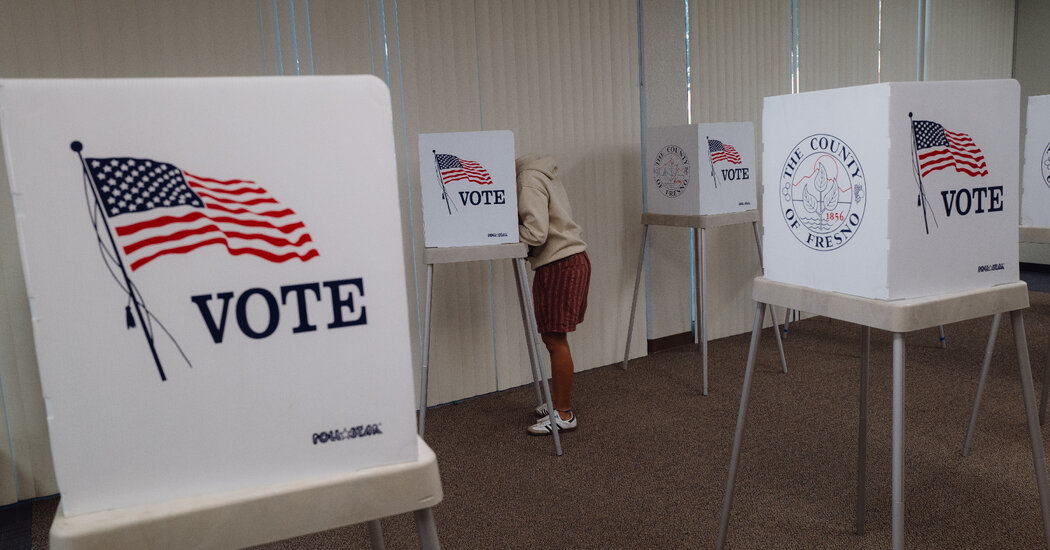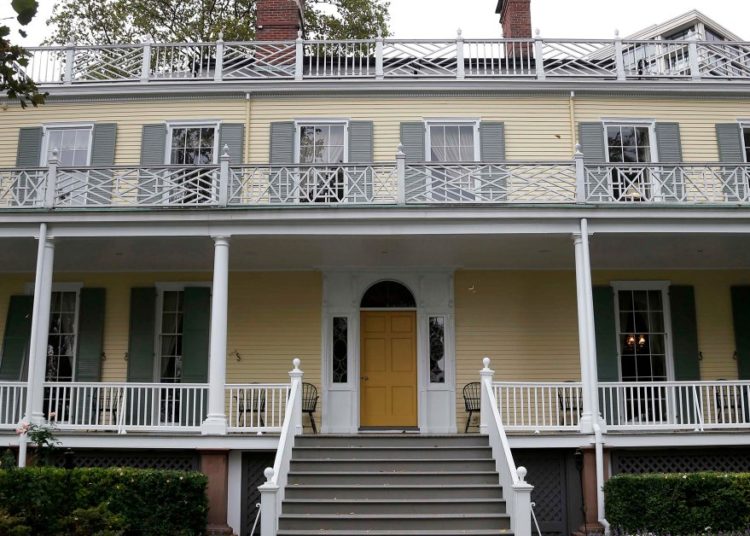Hours after California voters approved a redistricting measure that would flip as many as five House seats for Democrats next year, California Republicans filed a lawsuit on Wednesday morning challenging the new maps.
The suit, filed in the U.S. District Court for the Central District of California, argues that the new maps are unconstitutional because they improperly use voters’ race as a factor in drawing districts and asks the court to block them from taking effect.
The suit came the morning after California voters approved the redistricting measure, Proposition 50, which Gov. Gavin Newsom pushed to retaliate against gerrymandering that leaders in Texas and other Republican-led states approved at the request of President Trump.
It is not clear how successful the latest challenge will be. California Republicans were unsuccessful earlier this year at preventing the election through litigation, and Democrats have expressed confidence that their new maps would withstand legal scrutiny.
Proposition 50 suspended maps drawn by an independent commission and installed new congressional districts that were designed to help Democrats pick up five seats now held by Republicans. It was the most significant counterpunch by Democrats in a redistricting war that has swept the nation and upended political norms as Mr. Trump tries to keep the House of Representatives under Republican control.
The Republican lawsuit challenging Proposition 50 is hardly isolated. Since July, there have been at least 15 redistricting cases filed, including six in Texas and two in North Carolina, said Kareem Crayton, a vice president with the Brennan Center for Justice, which has been tracking redistricting litigation.
In Missouri, for instance, four groups have filed lawsuits, contending that the state constitution prohibited mid-decade redistricting, among other reasons.
Mr. Newsom said during the campaign that he was confident that California’s new maps would pass legal muster.
The lawsuit did not come as a surprise. Opponents of Mr. Newsom’s plan had filed unsuccessful lawsuits in August in an attempt to keep the issue off the ballot, and later vowed to challenge the maps again if they were approved by voters.
President Trump, in a social media post, indicated on Tuesday that Republicans were going to challenge the results in court. Mr. Trump often discredits election results he does not like, and he said without evidence that the California ballot measure was rigged and that the mail-ballot system was under “very serious legal and criminal review.”
Mr. Newsom responded later that Mr. Trump’s post was a sign that he knew he was losing and that Californians needed to stand up to the president “and his authoritarianism.”
Undergirding the new Republican lawsuit is a case before the Supreme Court that could limit a state’s ability to use race as a factor in drawing political maps. The case, Louisiana v. Callais, examines whether Louisiana lawmakers violated the Constitution by drawing a map that created two majority-Black congressional districts. A dozen white voters sued, arguing that the map was an illegal racial gerrymander that discriminated against them because of their race.
In arguments before the court last month, justices in the conservative majority appeared likely to rule for the plaintiffs and weaken a provision of the Voting Rights Act that has, for decades, allowed using race as a factor in drawing political maps to help minority voters elect the candidates of their choice.
The lawsuit filed on Wednesday accuses California of violating the Constitution “when it drew new congressional district lines based on race, specifically to favor Hispanic voters, without cause or evidence to justify it.” The lawsuit points to statements made by Democratic state lawmakers and a mapmaking consultant this year in which they referenced intentionally drawing some districts with a Latino majority.
Mark Meuser, an attorney for the plaintiffs challenging California’s map, said in September that the case before the Supreme Court could create a basis for challenging the maps that Democrats backed in California.
“These new lines are dovetailing very closely with what the Supreme Court is actually already hearing,” Mr. Meuser said during a presentation at the California Republican Party convention. “And as a result of that, I think they’re going to be very likely to enter a stay pending the outcome of this Louisiana case.”
It is not clear whether a Supreme Court decision, if it voids the use of race as a factor in mapmaking, would occur early enough to have an effect on the 2026 midterms.
An analysis by the nonpartisan Public Policy Institute of California found that the maps approved under Proposition 50 have the same number of majority-minority districts as the prior set of congressional maps that was created by the state’s independent redistricting commission, which considered race, among various factors. Both plans created 16 majority-Latino districts, the analysis found.
If the Supreme Court strikes down the Voting Rights Act provision that has required drawing districts for voters of color where they can make up a majority, Democrats would have bigger problems nationwide, beyond California’s new maps or its old maps.
Nicholas Stephanopoulos, a law professor at Harvard, said he thought it was unlikely the courts would stop California’s new maps from taking effect while the Supreme Court was weighing the Louisiana case.
“If there’s a properly adopted map and there’s some uncertainty over the law, typically the map will stay in effect, and it’s the plaintiffs’ case that will be deferred or delayed until there’s some resolution of the legal standard,” he said.
David W. Chen contributed reporting.
Laurel Rosenhall is a Sacramento-based reporter covering California politics and government for The Times.
The post Republicans Swiftly File Lawsuit in Bid to Block California’s New House Maps appeared first on New York Times.




